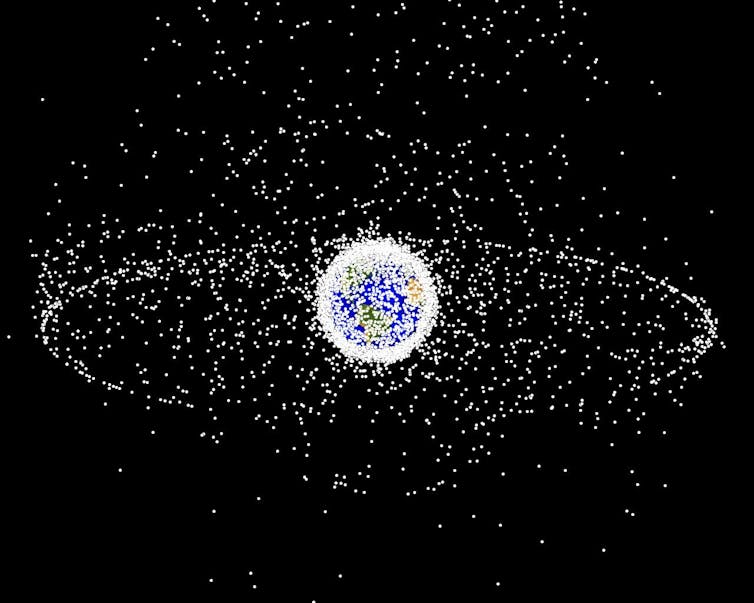Why Space Debris Cleanup Might Be a National Security Threat
Why Space Debris Cleanup Might Be a National Security Threat
As an international relations scholar who studies space law and policy, I have come to realize what most people do not fully appreciate: Dealing with space debris is as much a national security issue as it is a technical one.
Considering the debris circling the Earth as just an obstacle in the path of human missions is naive. As outer space activities are deeply rooted in the geopolitics down on Earth, the hidden challenge posed by the debris is the militarization of space technologies meant to clean it up.
To be clear, space debris poses considerable risks; however, to understand those risks, I should explain what it is and how it is formed. The term “space debris” refers to defunct human-made objects, relics left over from activities dating back to the early days of the space age. Over time that definition has expanded to include big and small things like discarded boosters, retired satellites, leftover bits and pieces from spacecraft, screwdrivers, tools, nuts and bolts, shards, lost gloves, and even flecks of paint.
From the 23,000 pieces of debris in Earth orbit that are larger than 5-10 centimeters that we can track and catalog, to the hundreds of millions that we cannot, there is little question that both big and small objects whizzing around at lethal speeds endanger the prospects for civilian, commercial and military missions in outer space. You may pick apart what the movie “Gravity” got wrong, but what it got unforgettably right was the sense of devastation wrought by an orbital debris cloud that destroyed equipment and killed three astronauts on impact. No matter its size, space debris can be lethal to humans and machines alike.
As of early 2018, the European Space Agency (ESA) estimates that there have been about 500 break-ups, collisions, explosions or other fragmentation events to date that yielded space debris. Some of these events are caused by accidents. NASA reported the first-ever known collision between two objects in space in July 1996, when a European booster collided with a French spacecraft. That incident created one new piece of debris, which was itself promptly cataloged. Yet accidents can also have a big impact on increasing the debris cloud. In 2009, for the first time ever, a functioning U.S. communications satellite, Iridium-33, collided with a non-functioning Russian one, Cosmos-2251, as they both passed over extreme northern Siberia. This single crash generated more than 2,300 fragments of debris.

A computer-generated image of objects in Earth orbit that are currently being tracked. Approximately 95 percent of the objects in this illustration are orbital debris, i.e., not functional satellites. The dots represent the current location of each item. The orbital debris dots are scaled according to the image size of the graphic to optimize their visibility and are not scaled to Earth. The image provides a good visualization of where the greatest orbital debris populations exist. NASA
Natural fragmentation versus deliberate destruction
Space debris may also be affected by the breakup of older spacecraft. In February 2015, a Defense Meteorological Satellite Program (DMSP-F13) spacecraft, called USA 109, which had gone up 20 years earlier, blew up due to a battery malfunction. It may have contributed 100 debris pieces that were tracked by military radars on Earth, and possibly also 50,000 shards larger than 1 millimeter that defied tracking because they are too tiny. Because of the satellite’s original high altitude, all those fragments will remain in orbit for decades, posing risks for other spacecraft. In November 2015, again due to a possible battery failure, another decommissioned U.S weather satellite, NOAA-16, crumbled adding 136 new objects to the debris cloud.
Notably, debris itself can also fragment. In February 2018, a discarded tank from the upper stages of a Ukrainian-Russian Zenit-3F rocket fragmented.

Fuel tank of an Iridium satellite launched in 1997-1998 re-entered the Earth’s atmosphere and crashed in a California orchard where it was discovered in late October 2018. Kings County Sheriff's Office
Debris can also fall back down on Earth, whether from natural orbital decay or controlled re-entry. Fortunately most such falling debris lands in the Earth’s oceans. But sometimes it does not, and these rare events may become a bigger hazard in the years ahead as the size of the debris cloud grows, and as the projected fleet of commercial small satellites becomes a reality. Recently, parts of Zenit rocket debris are reported to have ended up crash-landing in Peru. One of the most recent such events just took place in October 2018. The U.S. military identified a fuel tank from a decade-or-so-old Iridium satellite that crashed in a walnut orchard in Hanford, California.
Then there are the highly publicized deliberate events that add to the debris cloud. In 2007, China used a ground-based direct-ascent missile to take out its own aging weather satellite, the Fengyun-1C. This event created an estimated 3,400 pieces of debris that will be around for several decades before decaying.
China’s actions were widely seen as an anti-satellite test (ASAT), a signal of the country’s expanding military space capabilities. Having the ability to shoot down a satellite to gain a military advantage back on Earth exposes the basic nature of the threat: Those who are most dependent on space assets – namely, the United States, with an estimated 46 percent of the total 1,886 currently operational satellites – are also the most vulnerable to the space debris created deliberately. There is no doubt that the aggressor will also lose in such a scenario – but that collateral damage may be worthwhile if your more heavily space-dependent rival is dealt a more crippling blow.
Stealth ‘counterspace race’
The set of government or commercial solutions to counter orbital debris – whether lasers, nets, magnets, tethers, robotic arms or co-orbiting service satellites – have only fueled the prospects for a stealthy race for dominance in outer space.
The same technology that captures or zaps or drags away the debris can do the same to a functioning spacecraft. Since nobody can be sure about the intent behind such proposed “commercial” space debris cleanup technologies, governments will race to get ahead of their market competitors. It matters how and with what intent you counter space debris with dual-use technologies, and more so at a time of flux in the world order. Both the old and new space powers can easily cloak their military intentions in legitimate concerns about, and possibly commercial solutions to, debris hazards. And there are now a number of open assessments about space junk removal technologies that can double up as military programs, such as lasers or hunters.
This fusion of the market and the military is not a conspiracy but a reality. If you are a great power like the United States that is heavily dependent on space assets in both the economic and military realms, then you are vulnerable to both orbital debris and the technologies proposed for its cleanup. And both your allies and your rivals know it.
This is how we have ended up in a counterspace race, which is nothing like your grandfather’s space race. In a fundamental way, this new race reflects the volatile geopolitics of peer or near-peer competitors today, and there is no getting away from it in any domain. Just as on Earth, in the cosmos the world’s top space powers – the United States, China, Japan, Russia, India – have moved from merely space situational awareness to all-out battlespace awareness. If things stay the course, accidental or deliberate events involving orbital debris are poised to ravage peaceful prospects in outer space.
How then do we move forward so that outer space remains safe, sustainable and secure for all powers, whether big or small? This is not a task any one single nation — no matter how great — can carry out successfully on its own. The solutions must not only be technological or military, either. For peaceful solutions to last, deterrence and diplomacy, as well as public awareness, will have to be proactively forged by the world’s space powers, leaders and thinkers.
![]()
This article is republished from The Conversation under a Creative Commons license. Read the original article.





